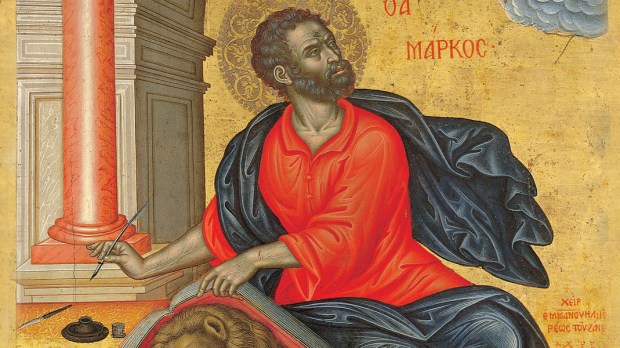While he was not one of the twelve apostles, St Mark wrote down the story of Jesus’ life in what is generally regarded as the oldest of the four gospels (which also happens to be the shortest). His feast is April 25.
It is believed that Mark became St Peter’s traveling companion and wrote down Peter’s sermons during their journeys. These recollections of Peter became the primary source for Mark’s gospel and it is traditionally believed that Mark traveled with Peter to Rome, where the gospel was written.
After spending time with Peter before his death, Mark is said to have journeyed to Alexandria in Egypt. It is there that he established the church, building up a stronghold of Christianity in that region. Eusebius writes about the founding of the church in Alexandria and of the fervor of the early Christians there.
And they say that this Mark was the first that was sent to Egypt, and that he proclaimed the Gospel which he had written, and first established churches in Alexandria.
And the multitude of believers, both men and women, that were collected there at the very outset, and lived lives of the most philosophical and excessive asceticism, was so great, that Philo thought it worth while to describe their pursuits, their meetings, their entertainments, and their whole manner of life.
Alexandria at the time contained a sizable population of Jews, but it is believed that many of the early converts to Christianity were native Egyptians. Traditionally the church at Alexandria is said to have been established by Mark around 42 AD, making it one of the earliest Christian churches to be established.
There is an early tradition (recounted here by the Coptic Orthodox Church in the UK) that recounts Mark’s entrance into the city and a providential meeting with the man who would be his successor.
When Saint Mark entered and walked through the streets of Alexandria, the most famous city in Egypt, his sandals were torn. While Ananias the cobbler was mending Saint Mark’s shoes, his finger was cut from the awl and he cried out: “O the one god!” Saint Mark healed the cobbler’s finger and spoke to him about who the ‘One God’ really was. Ananias invited Saint Mark to his home where he and his household were baptized after having professed their belief in the Christian Faith. Soon afterwards, many others believed and Ananias’s house became the meeting place for the faithful.In 62 AD, Saint Mark decided to leave Egypt to visit the new believers he had preached to in the Pentapolis. Before leaving, he ordained Ananias as bishop. He also founded a church in the Crypt where the Holy Family had taken refuge, thus fulfilling the prophesy of Isaiah: “In that day there will be an altar to the Lord in the midst of the land of Egypt, and a pillar to the Lord at its border… Then the Lord will be known to Egypt, and the Egyptians will know the Lord in that day” (Isaiah 19:19,21).
Read more:
5 Things to know about Coptic Christians
The Palm Sunday bombing in Egypt was at the St. Mark Coptic Cathedral in Alexandria, which is believed to have been built on the original site of Saint Mark’s first church in Alexandria and is the historical location of the ancient See of Alexandria.
On account of its early establishment, the church in Alexandria became known as one of the most important centers of Christianity and its leader was referred to as pappas or “Father” and later on as “Pope.” Some historians believe Mark led the Christians in Egypt for about 20 years before his martyrdom around the year 68. Before his death Mark ordained a bishop (Ananias), three priests and seven deacons to help him minister to the community. By the 3rd century the church in Alexandria was second in importance only to Rome.
Besides spreading the Christian faith throughout Egypt, Saint Jerome claims that Mark established an early school of learning that became the foundation for the famous Catechetical School of Alexandria. This school was well known in the ancient world and proved to be a vital center of philosophical and religious learning in the early centuries of Christianity.
All Coptic churches trace their lineage to Saint Mark and regard him as the Father of Coptic Christianity.

Read more:
The Copts: Why does the Islamic State kill Egypt’s Christians?

